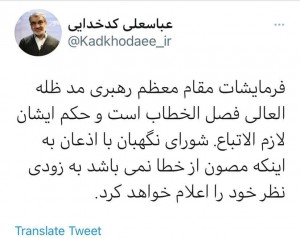The stellar wealth of Supreme Leader Ali Khamenei is no longer a secret issue in Iran. Not only Iranian citizens but almost all people who follow Iran’s developments have realized that Khamenei and his staff run the wealthiest institutions and conglomerates in the country.
This gigantic economic organization also leads the country and makes sensitive political decisions in favor of its financial interests. For instance, in the early of 2020 and while almost all countries had suspended their flights to China, as the Covid-19 epicenter, Mahan Airline affiliated with the Islamic Revolutionary Guard Corps (IRGC) was performing flights to China every day.
However, Khamenei’s main purpose is ensuring his reign and deriving supremacy to his favorite figure. To fulfill this goal, he organized a ‘sham’ Presidential election on June 18 to gain public acceptance for current Judiciary Chief Ebrahim Raisi, who is expected to be the next Supreme Leader after Khamenei’s eventual death.
To ensure Raisi’s victory in the Presidential race, Khamenei had already removed all potential rivals through the Guardian Council, an electoral watchdog body whose members are selected by the Supreme Leader and Judiciary Chief.
Indeed, Khamenei was profoundly concerned over another nationwide protest, as the main threat to his ruling system. “The enemy is neither in the U.S. nor in the Soviet Union or anyone else, it is here in Tehran beside us,” said Islamic Republic founder Ruhollah Khomeini in a public meeting in 1980 addressing people’s protests as the main threat to the theocracy.
“Our enemy is right here, they are lying that it is in the U.S.,” chanted protesters in recent anti-establishment protests addressing the authorities as to the main enemy in contrast to government officials’ claims about ‘foreigners’ role in unrests.’ In August 2018, Iranians stepped further and chanted, “Back against the enemy, facing the country” venting their anger over the government’s destructive policies against national interests.
Strange Memo from Khamenei’s Office
However, not only did the selection of Ebrahim Raisi not expand the social gap between the state and society but it brought severe consequences inside Khamenei’s office. In a memo on June 19 published by the semiofficial ISNA news agency, affiliated with ‘reformists,’ Sayyid Vahid Haqqanian, Khamenei’s deputy for executive affairs, raised significant talking points.
The strange memo of one of the senior officials at Khamenei’s office in a ‘reformists’ website’ shocked principlists’ structure. In his memo, Haqqanian described the attendance of three candidates, including Mohsen Rezaei, the former IRGC chief; Sayyid Amir Hossein Qazizadeh Hashemi, the deputy speaker of the Parliament (Majlis); and Abdolnasser Hemmati, the former governor of the Central Bank of Iran (CBI) in the Presidential election as a “divine blessing.”
“If after the withdrawal of fender candidates, these three persons had withdrawn from Presidential competitions—even if the Interior Minister rejected—there would definitely be created a great challenge for the holy system of Islamic Republic,” ISNA quoted him as saying.
“Remaining of these three rivals was definitely a divine blessing for [Ebrahim] Raisi… They definitely spent themselves on the [Islamic] Revolutions either knowingly or unknowingly,” Haqqanian added. “In the next four-year [Presidential] election, we would witness a maximum public participation and the choice of a strong and popular administration, and the good fortune toward the new President-elect again.”
In response, Tasnim news agency, affiliated with the IRGC Quds Force, slammed Haqqanian on June 20. “Using your personal analysis, meticulous and biased enemies criticized the Supreme Leader’s office and tried to take revenge from ‘people’s meaningful participation in the election’ with raising accusations of engineered election from the people and the Supreme Leader,” Tasnim wrote.
Khamenei’s June 4 Remarks Confirms Complications
In his remarks on June 4, Khamenei had implicitly confirmed this dispute inside his office. “During the disqualifications [by the Guardian Council led by himself], some of the disqualified nominations were oppressed; there were some untrue attributions to themselves or their family members,” Khamenei said. “I urge responsible apparatuses to compensate for those whose reputation had been discredited.”
Abbasali Kadkhodaei, the spokesperson of the Guardian Council, immediately described Khamenei’s remarks as a final say. “Regarding the Guardian Council is not immune from mistakes, it will announce its opinion soon,” tweeted Kadkhodaei signaling for qualification of his close friend Ali Larijani, the former Majlis Speaker.

However, Mehdi Fazaeli, the deputy chief of Perseverance and Publishing Khamenei’s Works bureau, disappointed Kadkhodaei and his allies. “The Supreme Leader’s remarks did not address the Guardian Council,” the official IRNA news agency quoted him as saying on June 4.
On the same afternoon, the council held a session announcing, “Uncredible reports did not influence on the Guardian Council’s decision… [Media] should avoid speculating and citation to unrealistic and false affairs.”
Indeed, the Presidential election and its aftermaths, including the Guardian Council’s mass disqualifications, Khamenei’s remarks, Haqqanian’s memo, and a silent dispute between Kadkhodaei and Fazaeli, indicate an extreme complication inside Khamenei’s inner circle.
Observers believe that there is a longstanding power struggle among Khamenei’s trustees. On the one hand, Hossein Taeb, the chief of the IRGC Intelligence Department, attempts to pave the path for Khamenei’s son Mojtaba to become the next Supreme Leader.
On the other hand, it seems that Haqqanian, who was called General Vahid for decades, no longer receives welcome on the behalf of other Khamenei’s lieutenants. Haqqanian’s memo was merely the tip of the iceberg and a clue that would resolve some knots about the complicated hierarchy in the coming months, Iranian analysts say.





